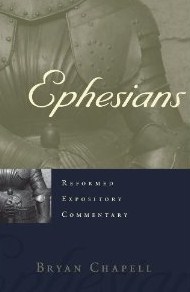Book Review: Ephesians (Reformed Expository Commentary)


Ephesians (Reformed Expository Commentary), Bryan Chapell, Phillipsburg: P&R, 2009. Hardcover, 383 pages, $31.51.
Commentaries are my most-used books. However, I rarely read through a commentary from front to back, certainly seldom ever in a short period of time. The last time I did that was in 1992 with John Stott’s The Spirit, The Church and the World. I read that commentary on Acts because of a positive review in Christian Renewal. While I don’t remember who the reviewer was (Tangelder? Farenhorst?), I recall reading that this was the kind of commentary that you’d want to enjoy from front to back. The reviewer was right.
Bryan Chapell’s Reformed Expository Commentary on Ephesians is the same kind of book. You could read it straight through quite comfortably and profitably. You could use this as a daily devotional. It’s written in a reader-friendly style.
The author is well-known as the president of the PCA seminary (Covenant) in St. Louis. He’s written a number of books, the most influential of which has been Christ-Centered Preaching. There he laid out his vision for how preaching should be focussed on what matters and, of course, tied tightly to the Scriptures. In this volume, originally a series of seminary chapel messages, he shows exactly how it’s done.
Readers interested in the technical aspects of the exegesis of Ephesians will find some assistance in the many footnotes. However, the commentary focuses more on the results of exegesis and application than it does on the nitty-gritty details. This makes it accessible to a wide audience. The excellent illustrations and anecdotes throughout also serve that purpose. Naturally, there will be places where other Reformed exegetes will disagree with Chapell’s conclusions. For instance, I’m not persuaded by his understanding of the reference to psalms, hymns and spiritual songs in Ephesians 5:19 – he believes that these refer to distinct categories that include “the songs of the New Testament church.” Nevertheless, his conclusions throughout certainly fall into the range found among Reformed commentators. He also regularly brings in supporting material from the Reformed confessions, which, for this Presbyterian author, means mostly the Westminster Standards.
Anybody could pick up this book and be edified by it. However, since it was originally written as a series of seminary chapel messages, theological students and pastors would be especially encouraged and challenged by it. Certainly as I was reading it, I felt as if Chapell were speaking directly to me in my ministry. He encourages pastors and prospective pastors to take the proper approach to their congregations, to buoy them with God’s love, rather than burden them with God’s displeasure. That said, the last chapters (dealing with Ephesians 5-6) would also be helpful for husbands, wives, and parents. All in all, this is an excellent volume and I can highly recommend it.



Thanks for this review. I have always been impressed by the richness of scholarship at Covenant Seminary and its application to the lives of believers, and will put this book in my wish list. Do you know how this particular series is progressing?